The HyperTexts
The Most Beautiful Lines in the English Language
I have selected some of the most beautiful lines in the English language from a variety
of sources: poems, novels, essays, epigrams, the lyrics of popular songs, etc.
In making my selections, I have focused on the beauty of words
and images because there is something utterly captivating―something
transcendent―about beauty. The writers of the most beautiful
lines in the English language includes names we'd expect to find,
such as William
Blake, Emily Dickinson, Robert Frost, Langston Hughes, Sappho, William
Shakespeare, Walt Whitman, Oscar Wilde and William Butler Yeats. But there are
also less-well-known names here, such as Ernest Dowson, William Dunbar and
Mary Elizabeth Frye (the latter a housewife who only wrote one poem of note, and
yet it may have become the most popular poem in the English language!).
A thing of beauty is a joy forever.
Its loveliness increases; it will never
pass into nothingness ...
―John Keats
I love you as certain dark things are to be loved,
in secret, between the shadow and the soul.
―Pablo Neruda
... you are whatever a moon has always meant
and whatever a sun will always sing is you ...
―e. e. cummings
compiled
by Michael R. Burch
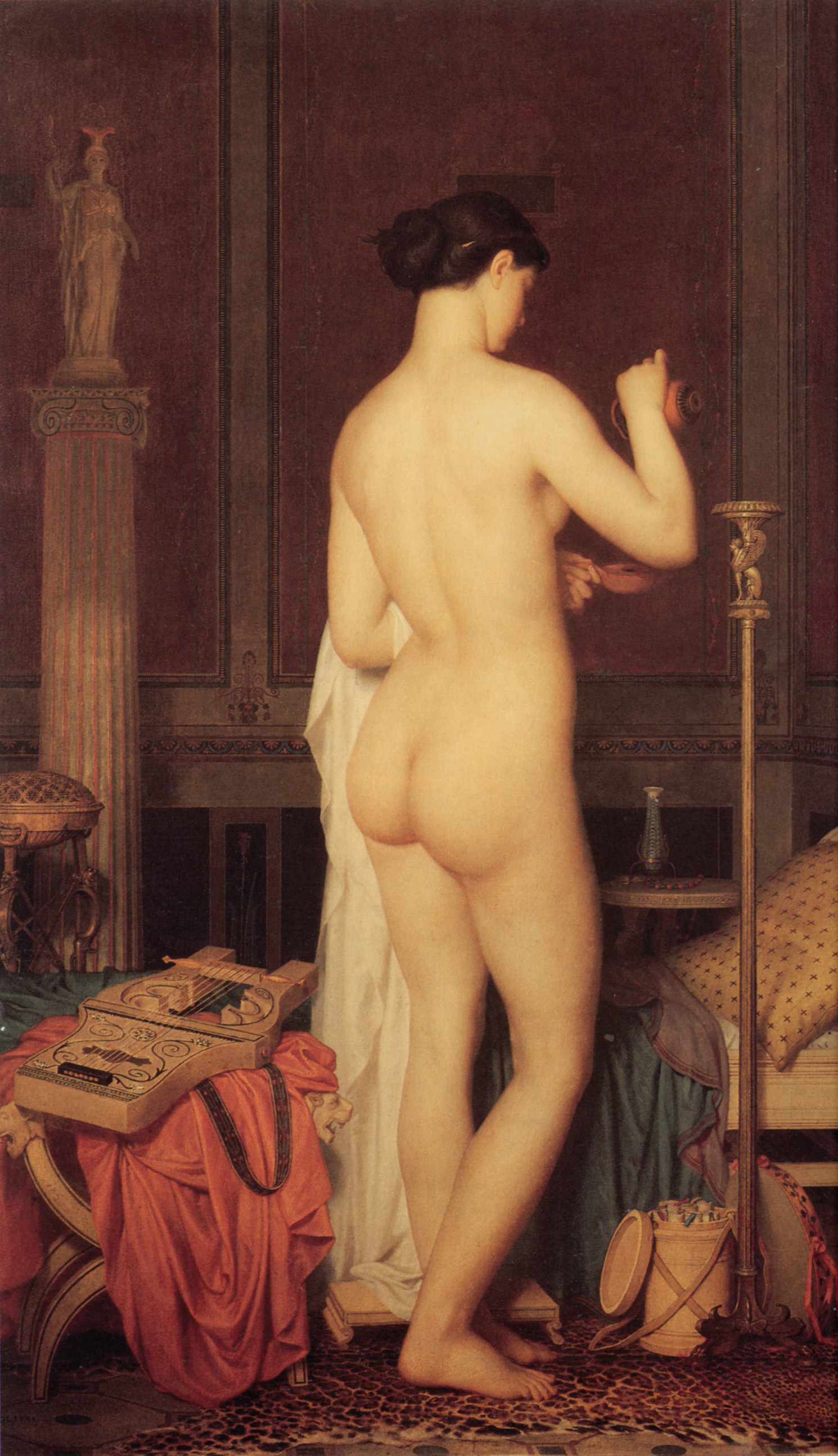
Gleyre Le Coucher de Sappho
by Marc-Charles-Gabriel Gleyre
Sappho, fragment 42
loose translation by Michael R. Burch
Eros harrows my heart:
wild winds sweeping desolate mountains
uprooting oaks.
Ten Wonderfully Moving, Poetic Epigrams
The births of all things are weak and tender, therefore we should have our eyes intent on beginnings.
—Michel de Montaigne
Each has his past shut in him like the leaves of a book known to him by heart, and his friends can only read the title.
—Virginia Woolf
We shall find peace. We shall hear the angels sing. We shall see the sky sparkling with diamonds.
—Anton Chekov
Life danced a jig on the sperm-whale's spout.
—Robert Lowell
Always the soul says to us all, Cherish your best hopes as a faith, and abide by
them in action.
—Margaret Fuller
The mountain violets have broken the rocks.
—Tennessee Williams
Happiness is like a butterfly:
the more you chase it, the more it will elude
you.
But if you turn your attention to other things,
it will come and sit softly
on your shoulder.
—Henry David Thoreau
I like not only to be loved but also to be told that I am loved.
The realm
of silence is large enough beyond the grave.
This is the world of light and
speech.
And I shall take leave to tell you that you are very dear.
—George Eliot
I expect to pass this way but once;
any good therefore that I can do,
or any
kindness that I can show to any fellow creature,
let me do it now.
Let me
not defer or neglect it,
for I shall not pass this way again.
—Etienne Griellet
It takes courage to push yourself to places that you have never been before,
to test your limits,
to break through barriers.
And the day came
when the risk it took to remain tight inside the bud
was more painful than the risk it took to blossom.
—Anaïs Nin
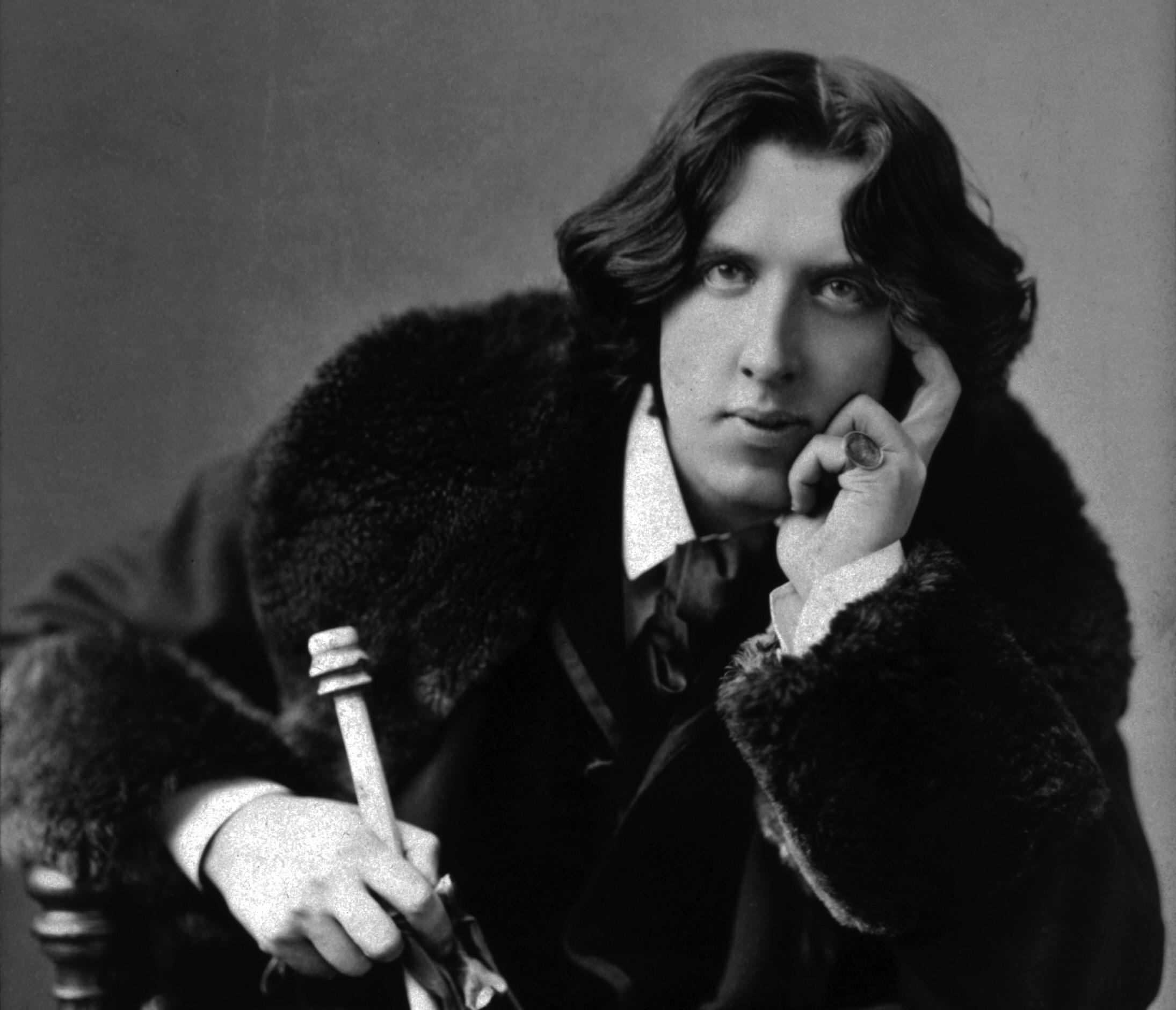
Requiescat
by Oscar Wilde
Tread lightly, she is near
Under the snow,
Speak gently, she can hear
The daisies grow ...
I believe Wilde's wonderful elegy may have been inspired or influenced by a poem
by the greatest of the Cavalier poets:
Another: Upon a Child
by Robert Herrick
Here a pretty baby lies
Sung asleep with lullabies:
Pray be silent, and not stir
Th' easy earth that covers her.
And I believe Herrick's poem may have been inspired or influenced by the lovely,
touching epigram of an ancient poet:
Lie lightly on her, turf and dew ...
She put so little weight on you.
—Marcus Valerius Martial
The lines above appear in a poem Martial wrote for a slave girl, Erotion, who died six days short of her sixth birthday.
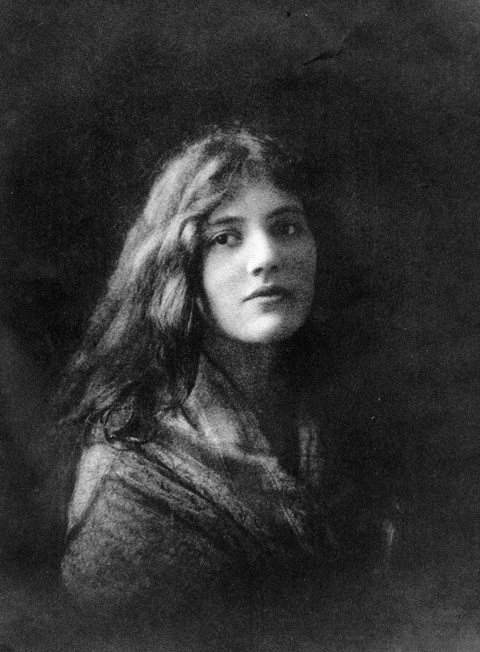
The picture above is of Maude Gonne, who inspired a number of poems by the great
Irish poet William Butler Yeats.
When You Are Old
by William Butler Yeats
When you are old and gray and full of sleep,
and nodding by the fire, take down this book
and slowly read, and dream of the soft look
your eyes had once, and of their shadows deep ...
Aedh Wishes for the Cloths of Heaven
by William Butler Yeats
I have spread my dreams under your feet;
Tread softly because you tread on my dreams ...
How Do I Love Thee?
by Elizabeth Barrett Browning
How do I love thee? Let me count the ways.
I love thee to the depth and breadth and height
My soul can reach ...
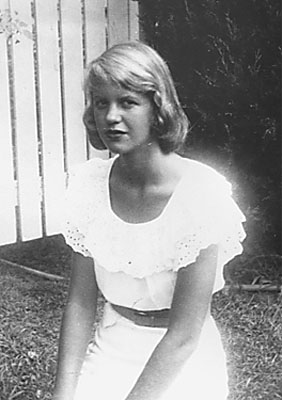
Barren Woman
by Sylvia Plath
Empty, I echo to the least footfall,
Museum without statues, grand with pillars, porticoes, rotundas.
In my courtyard a fountain leaps and sinks back into itself,
Nun-hearted and blind to the world. Marble lilies
Exhale their pallor like scent.

The Truth the Dead Know
by Anne Sexton
Gone, I say and walk from church,
refusing the stiff procession to the grave,
letting the dead ride alone in the hearse.
It is June. I am tired of being brave.

Cold-Blooded Creatures
by Elinor Wylie
Man, the egregious egoist
(In mystery the twig is bent)
Imagines, by some mental twist,
That he alone is sentient
Of the intolerable load
That on all living creatures lies,
Nor stoops to pity in the toad
The speechless sorrow of his eyes.
He asks no questions of the snake,
Nor plumbs the phosphorescent gloom
Where lidless fishes, broad awake,
Swim staring at a nightmare doom.
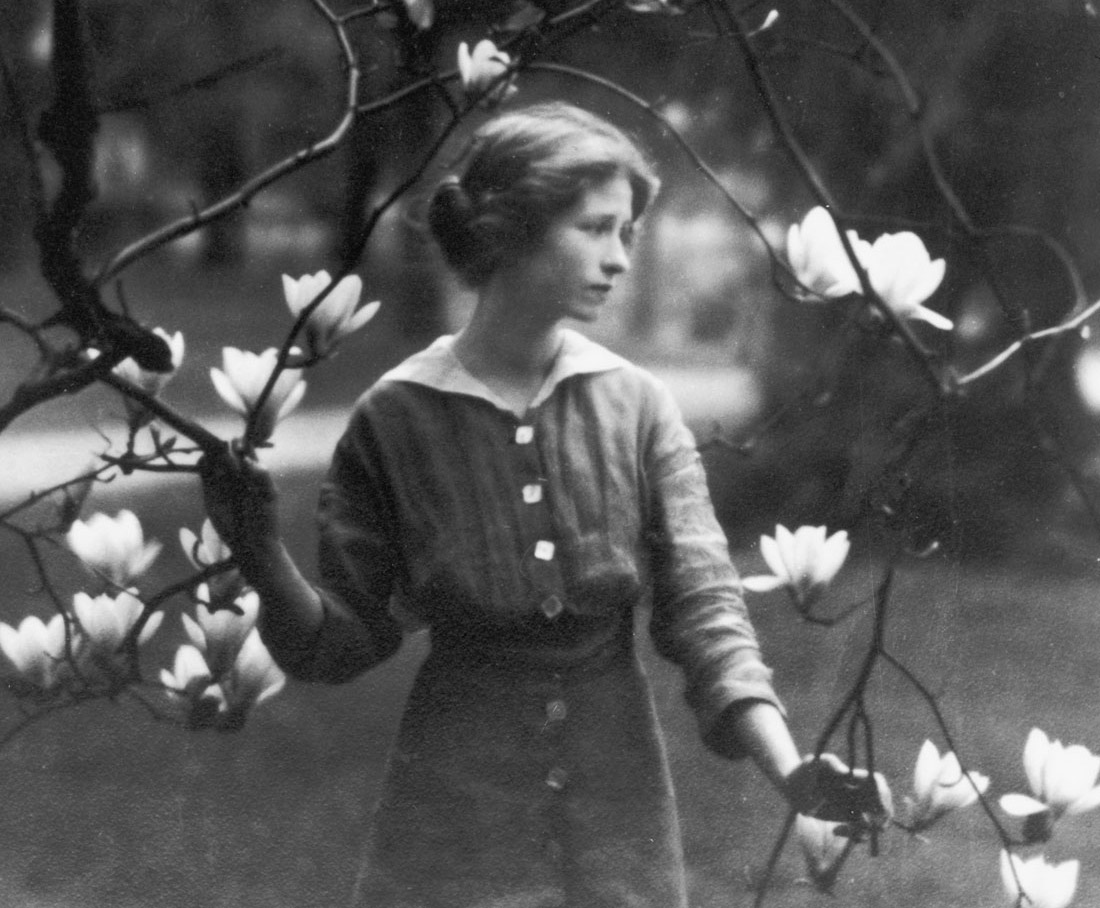
First Fig
by Edna St. Vincent Millay
My candle burns at both ends;
It will not last the night;
But ah, my foes, and oh, my friends—
It gives a lovely light!

Do Not Go Gentle Into That Good Night
by
Dylan Thomas
Do not go gentle into that good night,
Old age should burn and rave at close of day;
Rage, rage against the dying of the light.
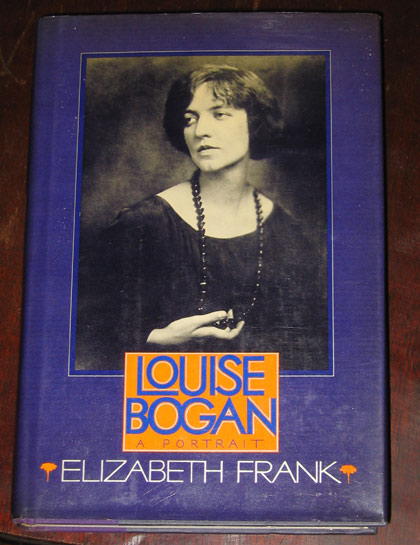
Song for the Last Act
by Louise Bogan
Now that I have your heart by heart, I see
The wharves with their great ships and architraves;
The rigging and the cargo and the slaves
On a strange beach under a broken sky.
O not departure, but a voyage done!
The bales stand on the stone; the anchor weeps
Its red rust downward, and the long vine creeps
Beside the salt herb, in the lengthening sun.
Great Lines from Poetry and Literature
They are not long, the days of wine and roses.―Ernest
Dowson
I have forgot much, Cynara! gone with the wind.―Ernest
Dowson
Any man's death diminishes me because I am involved in mankind; and
therefore never send to know for whom the bell tolls; it tolls for thee.—John
Donne
No man is an island.—John Donne
I am a rock. I am an island.—Paul Simon, begging to differ with
Donne
I sing myself and celebrate myself.—Walt Whitman, Leaves of Grass
I bequeath myself to the dirt to grow from the grass I love, / If you want me
again look for me under your boot-soles.—Walt Whitman, Leaves of Grass
Because I could not stop for Death, he kindly stopped for me.—Emily
Dickinson
This is the way the world ends / not with a bang but a whimper.—T.
S. Eliot, The Hollow Men
If equal affection cannot be, / let the more loving one be me.—W. H. Auden,
The More Loving One
In our village, folks say God crumbles up the old moon into stars.—Alexander
Solzhenitsyn, One Day in the Life of Ivan Denisovich
It frightened him to think what must have gone to the making of her
eyes.—Edith Wharton, The Age of Innocence
For poems are like rainbows; they escape you quickly.—Langston Hughes,
The Big
Sea
The caged bird sings with a fearful trill / Of things unknown but longed for
still / And his tune is heard on the distant hill / For the caged bird sings of
freedom.—Maya Angelou
I would always rather be happy than dignified.—Charlotte Brontë,
Jane Eyre
Journeys end in lovers meeting.—William Shakespeare, Twelfth Night
Everything was beautiful and nothing hurt.—Kurt Vonnegut,
Slaughterhouse-Five
She wasn’t doing a thing that I could see, except standing there leaning on the
balcony railing, holding the universe together.—J. D. Salinger,
A Girl I Knew
I took a deep breath and listened to the old brag of my heart; I am, I am, I
am.—Sylvia Plath, The Bell Jar
Beauty is an enormous, unmerited gift given randomly, stupidly.—Khaled Hosseini, And the Mountains Echoed
What are men to rocks and mountains?—Jane Austen, Pride and Prejudice
And when wind and winter harden / All the loveless land, / It will whisper of
the garden, / You will understand.—Oscar Wilde, To My Wife
The curves of your lips rewrite history.—Oscar Wilde, The Picture of Dorian
Gray
A dream, all a dream, that ends in nothing, and leaves the sleeper where he lay
down, but I wish you to know that you inspired it.—Charles Dickens,
A Tale of
Two Cities
And now that you don’t have to be perfect, you can be good.—John Steinbeck,
East of Eden
There are more things in Heaven and Earth, Horatio, than are dreamt of in your
philosophy.—William Shakespeare, Hamlet
America, I’ve given you all and now I’m nothing.—Allen Ginsburg, America
It might be that to surrender to happiness was to accept defeat, but it was a
defeat better than many victories.—W. Somerset Maugham, Of Human Bondage
At the still point, there the dance is.—T. S. Eliot, Four Quartets
Once upon a time there was a boy who loved a girl, and her laughter was a
question he wanted to spend his whole life answering.—Nicole Krauss,
The
History of Love
In spite of everything, I still believe people are really good at heart.—Anne
Frank, The Diary of Anne Frank
The pieces I am, she gather them and gave them back to me in all the right
order.—Toni Morrison, Beloved
How wild it was, to let it be.—Cheryl Strayed, Wild
She was lost in her longing to understand.—Gabriel Garcia Marquez,
Love in the
Time of Cholera
The half life of love is forever.—Junot Diaz, This Is How You Lose Her
There are darknesses in life and there are lights, and you are one of the
lights, the light of all lights.—Bram Stroker, Dracula
Tomorrow is always fresh, with no mistakes in it yet.—L. M. Montgomery,
Anne
of Green Gables
I could hear the human noise we sat there making, not one of us moving, not
even when the room went dark.—Raymond Carver, What We Talk About When We
Talk About Love
So we beat on, boats against the current, borne back ceaselessly into the past.—F. Scott Fitzgerald, The Great Gatsby
Out of the ash I rise / With my red hair / And I eat men like air.—Sylvia Plath,
Lady Lazarus
It does not do well to dwell on dreams and forget to live, remember that.—J.K.
Rowling, Harry Potter and the Sorcerer’s Stone
One must be careful of books, and what is inside them, for words have the power
to change us.—Cassandra Clare, The Infernal Devices
Do not stand at my grave and weep
by Mary Elizabeth Frye
Do not stand at my grave and weep:
I am not there; I do not sleep.
I am a thousand winds that blow,
I am the diamond glints on snow,
I am the sun on ripened grain,
I am the gentle autumn rain.
When you awaken in the morning’s hush
I am the swift uplifting rush
Of quiet birds in circling flight.
I am the soft starshine at night.
Do not stand at my grave and cry:
I am not there; I did not die.
This consoling elegy had a
very mysterious genesis, as it was written by a
Baltimore housewife who lacked a formal education, having been orphaned at age
three. As far as we know, she had never written poetry before. Frye wrote the poem on a ripped-off piece of a brown grocery bag,
in a burst of compassion for a Jewish girl who had fled the Holocaust
only to receive news that her mother had died in Germany. The girl was
weeping inconsolably because she couldn't visit her mother's grave. When the poem was named Britain's
most popular poem in a 1996 Bookworm poll, with more than 30,000
call-in votes despite not having been one of the critics'
nominations, an unlettered orphan girl had seemingly surpassed all England's
many cultured and degreed ivory towerists in the public's estimation. Although the poem's
origin was disputed for some time (it had been attributed to Native American and other sources),
Frye's authorship was confirmed in 1998 after investigative research by Abigail
Van Buren, the newspaper columnist better known as Dear Abby. The poem has
also been called I Am due to its rather biblical repetitions of the phrase.
Frye never formally published or copyrighted the poem, so we believe it is in
the public domain and can be shared, although we recommend that it not be used
for commercial purposes, since Frye never tried to profit from it herself.
The blackbird whirled in the autumn winds.
It was a small part of the pantomime.
―Wallace Stevens, Thirteen Ways of Looking at a
Blackbird
I do not know which to prefer,
The beauty of inflections
Or the beauty of innuendoes,
The blackbird whistling
Or just after.
―Wallace Stevens, Thirteen Ways of Looking at a Blackbird
I would like to be the air
that inhabits you for a moment
only. I would like to be that unnoticed
& that necessary.
—Margaret Atwood, Variation on the Word Sleep
The weight of the world is love.
Under the burden of solitude,
under the burden of dissatisfaction,
the weight, the weight we carry is love.
—Allen Ginsberg, Song
The blood-dimmed tide is loosed, and everywhere
The ceremony of innocence is drowned;
The best lack all conviction, while the worst
Are full of passionate intensity.
—William Butler Yeats, The Second Coming
Down, down, down into the darkness of the grave
Gently they go, the beautiful, the tender, the kind;
Quietly they go, the intelligent, the witty, the brave.
I know. But I do not approve. And I am not resigned.
—Edna St. Vincent Millay, Dirge Without Music
Adlestrop
by Edward Thomas
Yes. I remember Adlestrop—
The name, because one afternoon
Of heat the express-train drew up there
Unwontedly. It was late June.
Music When Soft Voices Die (To
—)
by Percy Bysshe Shelley
Music, when soft voices die,
Vibrates in the memory—
Odours, when sweet violets sicken,
Live within the sense they quicken.
Rose leaves, when the rose is dead,
Are heaped for the belovèd's bed;
And so thy thoughts, when thou art gone,
Love itself shall slumber on.
Sudden Light
by Dante Gabriel Rossetti
You have been mine before,—
How long ago I may not know:
But just when at that swallow's soar
Your neck turned so,
Some veil did fall,—I knew it all of yore.
Song
by Christina Rossetti
When I am dead, my dearest,
Sing no sad songs for me;
Plant thou no roses at my head,
Nor shady cypress tree:
Be the green grass above me
With showers and dewdrops wet;
And if thou wilt, remember,
And if thou wilt, forget.
Whoso List to Hunt
by Sir Thomas Wyatt
Whoso list to hunt, I know where is an hind,
But as for me, alas, I may no more.
The vain travail hath wearied me so sore,
I am of them that farthest cometh behind.
Yet may I by no means my wearied mind
Draw from the deer, but as she fleeth afore
Fainting I follow. I leave off therefore,
Since in a net I seek to hold the wind.
Sweet Rose of Virtue
by William Dunbar [1460-1525]
loose translation by Michael R. Burch
Sweet rose of virtue and of gentleness,
delightful lily of youthful wantonness,
richest in bounty and in beauty clear
and in every virtue that is held most dear―
except only that you are merciless.
Bread and Music
by Conrad Aiken
Music I heard with you was more than music,
And bread I broke with you was more than bread;
Now that I am without you, all is desolate;
All that was once so beautiful is dead.
Your hands once touched this table and this silver,
And I have seen your fingers hold this glass.
These things do not remember you, belovèd,
And yet your touch upon them will not pass.
For it was in my heart you moved among them,
And blessed them with your hands and with your eyes;
And in my heart they will remember always,—
They knew you once, O beautiful and wise.
Piano
by D. H. Lawrence
Softly, in the dusk, a woman is singing to me;
Taking me back down the vista of years, till I see
A child sitting under the piano, in the boom of the tingling strings
And pressing the small, poised feet of a mother who smiles as she sings.
In spite of myself, the insidious mastery of song
Betrays me back, till the heart of me weeps to belong
To the old Sunday evenings at home, with winter outside
And hymns in the cozy parlor, the tinkling piano our guide.
So now it is vain for the singer to burst into clamor
With the great black piano appassionato. The glamour
Of childish days is upon me, my manhood is cast
Down in the flood of remembrance, I weep like a child for the past.
Come Slowly, Eden
by Emily Dickinson
Come slowly—Eden
Lips unused to thee—
Bashful—sip thy jasmines—
As the fainting bee—
Reaching late his flower,
Round her chamber hums—
Counts his nectars—alights—
And is lost in balms!
Go, Lovely Rose
by Edmund Waller
Go, lovely Rose,—
Tell her that wastes her time and me,
That now she knows,
When I resemble her to thee,
How sweet and fair she seems to be.
VIII — from Sunday
Morning
by Wallace Stevens
She hears, upon that water without sound,
A voice that cries, The tomb in Palestine
Is not the porch of spirits lingering.
It is the grave of Jesus, where he lay.
We live in an old chaos of the sun,
Or old despondency of day and night,
Or island solitude, unsponsored, free,
Of that wide water, inescapable.
Deer walk upon our mountains, and the quail
Whistle about us their spontaneous cries;
Sweet berries ripen in the wilderness;
And, in the isolation of the sky,
At evening, casual flocks of pigeons make
Ambiguous undulations as they sink,
Downward to darkness, on extended wings.
The Garden
by Ezra Pound
Like a skein of loose silk blown against a wall
She walks by the railing of a path in Kensington Gardens,
And she is dying piece-meal
of a sort of emotional anemia.
And round about there is a rabble
Of the filthy, sturdy, unkillable infants of the very poor.
They shall inherit the earth.
In her is the end of breeding.
Her boredom is exquisite and excessive.
She would like some one to speak to her,
And is almost afraid that I
will commit that indiscretion.
Lullaby
by W. H. Auden
Lay your sleeping head, my love,
Human on my faithless arm:
Time and fevers burn away
Individual beauty from
Thoughtful children, and the grave
Proves the child ephemeral:
But in my arms till break of day
Let the living creature lie,
Mortal, guilty, but to me
The entirely beautiful ...
The Snow Man
by
Wallace Stevens
One must have a mind of winter
To regard the frost and the boughs
Of the pine-trees crusted with snow;
And have been cold a long time
To behold the junipers shagged with ice,
The spruces rough in the distant glitter
Of the January sun; and not to think
Of any misery in the sound of the wind,
In the sound of a few leaves,
Which is the sound of the land
Full of the same wind
That is blowing in the same bare place
For the listener, who listens in the snow,
And, nothing himself, beholds
Nothing that is not there and the nothing that is.
Come Lord and Lift
by T. Merrill
Come Lord, and lift the fallen bird
Abandoned on the ground;
The soul bereft and longing so
To have the lost be found.
The heart that cries—let it but hear
Its sweet love answering,
Or out of ether one faint note
Of living comfort wring.
To Earthward
by Robert Frost
I had the swirl and ache
From sprays of honeysuckle
That when they’re gathered shake
Dew on the knuckle.
Those Winter Sundays
by Robert Hayden
What did I know, what did I know
of love's austere and lonely offices?
A Noiseless Patient Spider
by Walt Whitman
A noiseless patient spider,
I mark'd where on a little promontory it stood isolated,
Mark'd how to explore the vacant vast surrounding,
It launch'd forth filament, filament, filament, out of itself,
Ever unreeling them, ever tirelessly speeding them.
And you O my soul where you stand,
Surrounded, detached, in measureless oceans of space,
Ceaselessly musing, venturing, throwing, seeking the spheres to connect them,
Till the bridge you will need be form'd, till the ductile anchor hold,
Till the gossamer thread you fling catch somewhere, O my soul.
To Celia
by Ben Jonson
Drink to me, only, with thine eyes,
And I will pledge with mine;
Or leave a kiss but in the cup,
And I'll not look for wine.
Tears, Idle Tears
by Lord Alfred Tennyson
Tears, idle tears, I know not what they mean,
Tears from the depth of some divine despair
Rise in the heart, and gather to the eyes,
In looking on the happy Autumn fields,
And thinking of the days that are no more.
Acquainted With The Night
by Robert Frost
I have been one acquainted with the night.
I have walked out in rain—and back in rain.
I have outwalked the furthest city light.
I have looked down the saddest city lane.
I have passed by the watchman on his beat
And dropped my eyes, unwilling to explain.
I have stood still and stopped the sound of feet
When far away an interrupted cry
Came over houses from another street,
But not to call me back or say good-by;
And further still at an unearthly height,
One luminary clock against the sky
Proclaimed the time was neither wrong nor right.
I have been one acquainted with the night.
Dover Beach
by Matthew Arnold
Ah, love, let us be true
To one another! for the world which seems
To lie before us like a land of dreams,
So various, so beautiful, so new,
Hath really neither joy, nor love, nor light,
Nor certitude, nor peace, nor help for pain;
And we are here as on a darkling plain
Swept with confused alarms of struggle and flight,
Where ignorant armies clash by night.
Song
by John Donne
Go and catch a falling star,
Get with child a mandrake root,
Tell me where all past years are,
Or who cleft the devils foot ...
Full Fathom Five
by William Shakespeare
Full fathom five thy father lies;
Of his bones are coral made;
Those are pearls that were his eyes:
Nothing of him that doth fade
But doth suffer a sea-change
Into something rich and strange.
Sea-nymphs hourly ring his knell:
Ding-dong.
Hark! now I hear them — ding-dong, bell.
Spring and Fall, to a Young Child
by Gerard Manley Hopkins
Margaret, are you grieving
Over Goldengrove unleaving?
Leaves, like the things of man, you
With your fresh thoughts care for, can you?
Song of Solomon
attributed to King Solomon
I am the rose of Sharon, and the lily of the valleys.
As the lily among thorns, so is my love among the daughters.
As the apple tree among the trees of the wood, so is my beloved among the sons.
I sat down under his shadow with great delight, and his fruit was sweet to my taste.
He brought me to the banqueting house, and his banner over me was love.
Stay me with flagons, comfort me with apples: for I am sick of love.
His left hand is under my head, and his right hand doth embrace me.
I charge you, O ye daughters of Jerusalem, by the roes,
and by the hinds of the field, that ye stir not up, nor wake my love, till he please.
It Is A Beauteous Evening, Calm And Free
by William
Wordsworth
It is a beauteous evening, calm and free,
The holy time is quiet as a Nun
Breathless with adoration; the broad sun
Is sinking down in its tranquillity ...
Ozymandias
by Percy Bysshe Shelley
My name is Ozymandias, king of kings:
Look on my works, ye Mighty, and despair!
A Red, Red Rose
by Robert Burns
Oh my luve is like a red, red rose,
That's newly sprung in June:
Oh my luve is like the melodie,
That's sweetly play'd in tune.
As fair art thou, my bonie lass,
So deep in luve am I;
And I will luve thee still, my dear,
Till a' the seas gang dry.
Till a' the seas gang dry, my dear,
And the rocks melt wi' the sun;
And I will luve thee still, my dear,
While the sands o' life shall run.
And fare thee weel, my only luve!
And fare thee weel a while!
And I will come again, my luve,
Tho' it were ten thousand mile!
Upon Julia's Clothes
by Robert Herrick
Whenas in silks my Julia goes,
Then, then, methinks, how sweetly flows
The liquefaction of her clothes.
Next, when I cast mine eyes and see
That brave vibration each way free,
Oh, how that glittering taketh me!
Related pages:
The
Most Beautiful Sonnets in the English Language;
The Best Anglo-Saxon Riddles and Kennings;
Ancient Greek Epigrams and Epitaphs,
The Ten Greatest
Poems Ever Written
The HyperTexts








